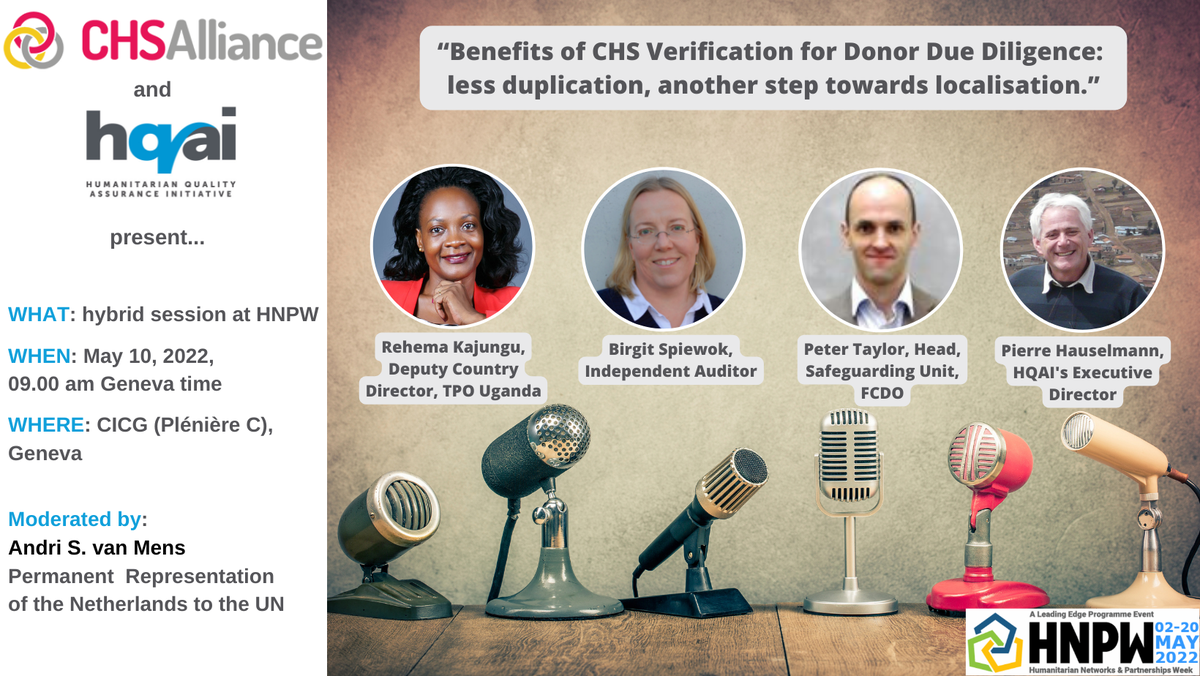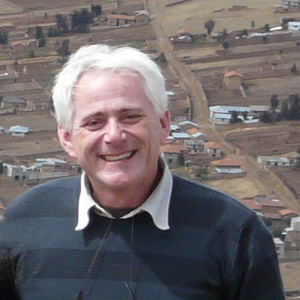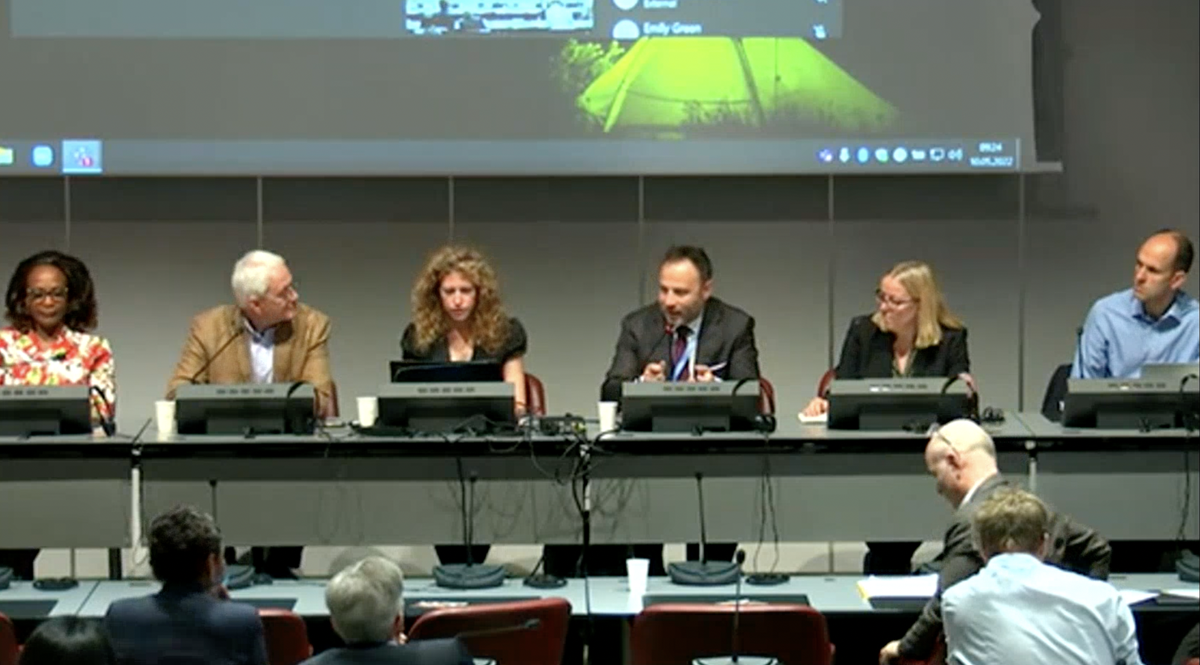Benefits of CHS Verification for Donor Due Diligence: less duplication, another step towards localisation
Benefits of CHS Verification for Donor Due Diligence: less duplication, another step towards localisation
Is it possible to streamline donor due diligence and meet the needs of local realities? How can obstacles be overcome?
Let’s hear it from the different aid sector stakeholders who spoke at HNPW.
Watch videoMay 2022
During the 2022 Humanitarian Networks and Partnerships Weeks (HNPW) organised by OCHA, HQAI and CHSA held the session “Benefits of CHS Verification for Donor Due Diligence: less duplication, another step towards localisation”. The aim was to give the floor to representatives of key stakeholders in the aid sector -more specifically auditors, representatives of local NGOs and donors- to hear about already existing solutions to the challenges linked to donor due diligence alignment and localisation.
Ultimately, the speakers’ shared goal was to find common ground to foster cooperation among all stakeholders, a beneficial interaction that could make it easier for humanitarian workers to effectively help people in need.
The panel session
With a view to align partners’ due diligence processes, and allow for savings in human and financial resources, specific tools have already been developed as of today, in particular by HQAI on the basis of the Core Humanitarian Standard on Quality and Accountability (CHS). The panel started with the presentation of a concrete example of the application of CHS certification audits to respond to donor due diligence requirements and reduce duplication. The discussion then further analysed the practical mechanisms required in the implementation phase and presented a pilot project to test whether those tools could facilitate direct donor funding of local organisations. Finally, a national organisation put theory into practice and explained the direct benefits for them.

Takeaways
Breaking the ice on the technical challenges of this topic, independent senior auditor Birgit Spiewok presented an example of due diligence harmonisation she performed in 2020. It was a so-called bridge exercise between a CHS initial audit of an NGO, Diakonia Sweden, and a pre-assessment for ECHO for the Framework Partnership Agreement (FPA). As a final result, 80% of the information needed to complete ECHO’s pre-assessment was readily available in the CHS audit. Of the remaining 20% of the missing information, only 4% was completely out of the scope of the CHS audit, but yet easily retrievable through other means.

The first takeaway lesson from this exercise was that harmonisation saves time and money, because it avoids unnecessary data duplication if the information has already been validated by an auditing company. The second finding is that a CHS audit is a very rigorous undertaking, checking not only the policies and procedures of an organisation, but also thoroughly assessing the practice in the field through the collection of feedback from local communities. Finally, this complementary process allowed Diakonia to come up with an integrated improvement plan addressing all correlated findings, thus providing a basis to make decisions and work on the necessary changes.
Birgit Spiewok, HQAI-registered independent auditor
Pierre Hauselmann, HQAI’s Executive Director, added that this exercise with a slightly extended CHS audit has already been performed multiple times by HQAI, which is accredited against ISO standards. Thanks to this CHS audit, covering all processes of an organisation, it would be possible to avoid going through several due diligence processes. For example, as per the Act Church of Sweden (Act CoS) NGO, HQAI was able to complete the full ECHO report template with the information from the CHS audit. The report was validated by ECHO, leading to the acceptance of Act CoS as its partner. The CHS audit costed Act CoS 90% less than normal quotes, saving important money and resources that could be used to help affected populations in the field.

What is interesting in terms of harmonisation is that this type of audit can be valid for all organisations going through similar due diligence processes. In order for this to work, the credibility of the auditing organisation is fundamental, because donors need to believe in the robustness of the assessment, and be ready to outsource quality assurance to an external auditing body.
Pierre Hauselmann, HQAI’s Executive Director
From the donors’ perspective, Peter Taylor, Head of the Safeguarding Unit at FCDO, highlighted that donors need to have confidence in their partners to keep people safe from harm when it comes to PSEAH requirements. The above mentioned examples were for FCDO very encouraging, but, in order for this to really work, “it’s got to be system-wide”, through the catalysing of all sectors of society.
The pilot project that HQAI has developed within ECHO's, FCDO's and DANIDA's frameworks will test this proposition, that certifying against this “let’s call it CHS+”, in Mr. Taylor’s words, will guarantee quality assurance, safety and protection from sexual abuse and harassment, as already required by a larger group of donors for financing. The pilot is being carried out in Bangladesh and Ethiopia, and hopefully part of the results will be available by the end of 2022.
FCDO’s hope is that HQAI, the whole concerned community, major donors to the UN and implementing partners will take stock of the results for a much more simplified and clearer system to rely on in the future. This could also imply, on the donors’ side, to adjust their existing requirements, because a successful implementation requires flexibility in all directions:

It will be a gradual but exciting phase! Being able to rely on an external body will reduce the burden for all stakeholders, including us.
Peter Taylor, Head of the Safeguarding Unit at FCDO
To conclude this insightful session, the Deputy Country Director of the Eastern African NGO TPO Uganda, Rehema Kajungu, took the floor to explain what the CHS audits concretely meant to them and their work. TPO Uganda provides psychosocial support services in Uganda, and has been independently verified against the CHS since 2018. Currently, the organisation is in the process of bridging to CHS Certification as a natural evolution in the application of the Core Humanitarian Standard principles.
Independent Verification helped them evolve internal quality and operational processes, as well as systems, policies and procedures. It improved the policy environment as a whole, in particular concerning safeguarding and PSEAH, risk management and others, like the feedback mechanism from communities, whom they consult also for the planning and implementation phase, and who now know what to expect from them. Ms. Kajungu said that their ability to attract donors really benefitted from it.

This process has empowered us as much as our partners. It has made us accountable to them and the communities we serve, who have entrusted us with opportunities to take on leadership roles not only at a district but also at a national level. For example, we have been entrusted by the Ministry of Health to chair and coordinate the national working group for mental health and psychosocial support, and many more achievements in terms of trust from both the government and donors. In the last three years we’ve been doing the audits, this has increased our resources from donors such as Dutch Relief Alliance, USAID, Danish Church Aid, UNHCR, and, to some extent, ECHO, who have also used our audit reports to shorten their due diligence processes.
As an example, we obtained a US $20 million grant from USAID to lead a project as the first time ever local prime agency in the country, subcontracting three other national NGOs as implementing partners. Our annual budget has consequently increased by 40%, and our staff motivation has greatly improved, leading to enhanced donor satisfaction as well. To conclude, I would encourage organisations, especially local and national, to sign up with the CHS Alliance and for a due diligence assessment scheme that suits their situation, because the benefits they will enjoy are many, from increased donor confidence and funding to improved internal policies and procedures, to being more accountable to the people that they serve. And finally, addressing the donors, I would like to reassure them that the HQAI audits and auditors are extremely detailed, and their rigour can be trusted.
Rehema Kajungu, Deputy Country Director of TPO Uganda
On such positive note, the session ended with the hope that these successful examples can finally be translated into reality on a larger scale as well, and become common practice in the sector.
Category
